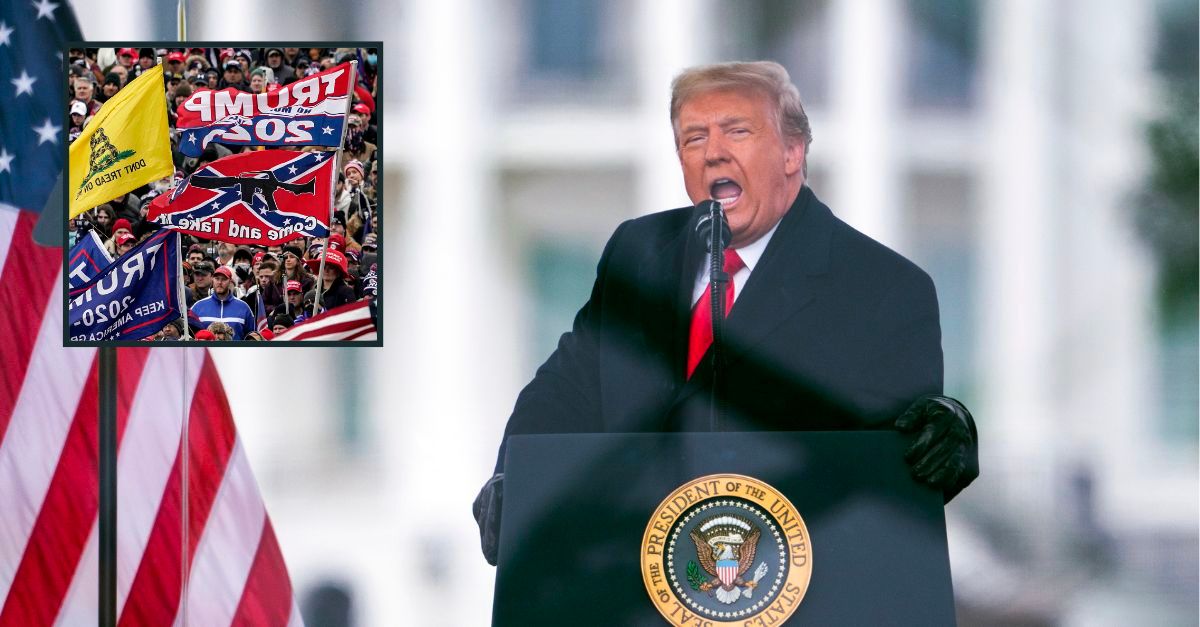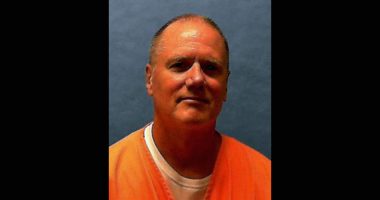
Main: President Donald Trump speaks during a rally protesting the electoral college certification of Joe Biden as President in Washington, Jan. 6, 2021 (AP Photo/Evan Vucci). Inset: Trump supporters listening to him speak as they rally in Washington before the attack on the U.S. Capitol (AP Photo/Evan Vucci).
The federal government has agreed not to share a recently compiled list identifying the FBI agents and analysts who worked on investigations into the Jan. 6 attack on the Capitol.
The agreement was reached Friday morning, just before the DOJ was scheduled to appear in court and defend against a federal lawsuit filed anonymously earlier this week by a group of agents who feared the information would be used by President Donald Trump as part of his promise to “exact revenge” on those who investigated him.
Following a protracted hearing on the matter Thursday, the two sides came to an understanding regarding a consent agreement that requires the federal government to provide the plaintiffs with at least two days notice before they can share the list with the public.
“The Government will not disseminate the list at issue in these consolidated cases (and any subsequent versions of that list, including any record pairing the unique identifiers on the list to names) to the public, directly or indirectly, before the Court rules on Plaintiffs’ anticipated motions for a preliminary injunction,” U.S. District Judge Jia M. Cobb wrote in the one-page order. “Absent further order of the Court, the Government may terminate the proscription set forth in Paragraph 1 at its election by providing two business days’ notice to the parties and the Court of its intent to terminate.”
Attorneys for the anonymous group of FBI agents on Tuesday filed a pair of lawsuits — which have since been consolidated — seeking a temporary restraining order prohibiting the government from sharing the list, claiming that the Trump administration would unlawfully use the information to conduct mass firings at the bureau in retaliation for the agents’ work. The agents also asserted that sharing the list publicly would put them in danger of “imminent harm” from the president’s most ardent supporters, particularly the violent felons he pardoned for their roles in the Capitol riot.
The suits were filed after agents on Monday were directed to fill out surveys identifying the roles they played in the Mar-a-Lago and Jan. 6 cases, with the aggregated information being forwarded to “upper management” at the DOJ. The three-page survey was included as an exhibit in one of the filings and included 13 questions about the agents’ work.
“What was your/your employee’s title when you/your employee participated in investigation(s) or prosecution(s) of events that occurred at or near the US Capitol on January 6, 2021?” read one of the questions.
“What was your/your employee’s role in the investigation(s) or prosecution(s) relating to events that occurred at or near the US Capitol on January 6, 2021? Select all that apply,” read another.
The agents claim the survey is part of a directive issued by Trump instructing the DOJ to “conduct a review and purge” of FBI personnel involved in the aforementioned investigations and prosecutions, placing them in danger of losing their jobs or, worse, being targeted by any of the more than 1,200 convicted rioters Trump went on to pardon his first day in office.
“Plaintiffs assert that the purpose for this list is to identify agents to be terminated or to suffer other adverse employment action,” one of the complaints stated. “Plaintiffs reasonably fear that all or parts of this list might be published by allies of President Trump, thus placing themselves and their families in immediate danger of retribution by the now pardoned and at-large Jan. 6 convicted felons.”
During Thursday’s hearing, the Justice Department said it would agree to enter into a temporary consent agreement representing that it would not disseminate the information to the public, but could not make the same guarantee about the rest of the federal government. That did not quell concerns from attorneys representing the FBI agents.
“We are one step away from the [agents’] names being released,” attorneys for the plaintiffs said, a sentiment that was repeated multiple times throughout the proceedings. The plaintiffs’ attorneys went through multiple examples of the Trump administration and Elon Musk releasing the names of public servants they had either ousted or sought to oust in the short time they have been in power and continued to insist that an agreement that only bound the DOJ was insufficient.
“We don’t have assurances that DOGE does not have access to DOJ systems,” one of the plaintiff’s attorneys said. “We don’t have assurances other nongovernment persons operating within DOJ would not immediately release those names.”
Referring to the Jan. 6 convicts who had been granted pardons, plaintiff attorney Mark Zaid told the court that at least one individual had already “threatened to kill the agents who worked on their case.”
Another attorney for the plaintiffs argued it would be a “big problem” if “the list made its way to Musk” before the court could stop the information from getting out, saying, “the risk to these agents is horrendous.”
The DOJ pushed back on the plaintiffs’ claims, repeatedly emphasizing that the “imminent harm” of having their information publicly exposed was entirely “speculative” and therefore could not be the basis for the court issuing an order that encompassed the entirety of the federal government.
“Plaintiffs can point to nothing that suggests the Government intends to make public the list in this case,” DOJ attorneys wrote in a Thursday court filing. “To the contrary, the Department and FBI management have repeatedly stressed the purpose of the list is to conduct an internal review, not expose dedicated special agents to public insult or ridicule.”







